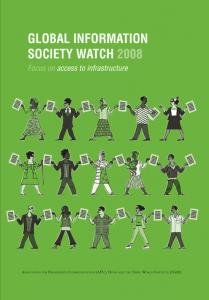 GISWatch 2008 How do we ensure access to the internet is a human right enjoyed by everyone?
GISWatch 2008 How do we ensure access to the internet is a human right enjoyed by everyone?
This is one of the critical questions asked by an annual publication that highlights the importance of people’s access to information and communications technology (ICT) infrastructure – and where and how countries are getting it right or wrong, and what can be done about it.
Global Information Society Watch 2008, published in print and online by the Association for Progressive Communications (APC), the Third World Institute, and Dutch development organisation Hivos, collects the perspectives of ICT academics, analysts, activists and civil society organisations from across the globe in over 50 reports.
“[Access to infrastructure] is beginning to be considered of less importance by some development funders and practitioners, including civil society and communication and information activists,” argue the publishers in the book preface.
“One of the consequences of this is the development of a conventional wisdom that leaves the domain of infrastructure development to the market; to operators and investors that do not always see the broader social value of communications in society, to governments that lack capacity and often clear strategy, and to international institutions that tend to approach it in a limited and ‘technocratic’ way.”
Internet – the petrol of the new global economy
Several thematic reports in GISWatch 2008 tackle burning issues facing access to infrastructure, and related concerns. For instance, analyst Peter Lange lays out the pros and cons in a lucid discussion on net neutrality called “The end of the internet as we know it?” while Sunil Abraham, from the Centre for Internet and Society in Bangalore, makes the bold observation that most computer users today remain “digitally colonised” due to our unquestioning use of proprietary usually Microsoft-produced software. Russell Southwood asserts that bandwidth, like oil, is a crucial resource in the 21st Century, in his discussion on accessing content, and Daniel Pimienta, from the Networks and Development Foundation, points out that as the world wide web grows exponentially, search engines are losing their capacity to index it.
Ben Akoh, from the Open Society Initiative of Western Africa, uncomplicates the sometimes tangled issues that lie behind the equitable management of spectrum, in the process observing that:
“[In] the African context the mobile phone capitalises on the innate orality of African culture and society, perhaps explaining its rapid uptake. But, in the modern setting, it is an orality that has turned in on itself, because the cost of communication may have also eaten into the disposable income of the individual.”
How global institutions, such as the United Nations and International Telecommunication Union are treating access issues are laid out by ICT for development analyst David Souter. The publication also offers another take on indicators, where authors Mike Jensen and Amy Mahan confront the fact that global consensus has not been reached on how to measure the information society in a way that results in reasonable comparisons between countries.
Reports from almost forty countries
Thirty-eight country reports have been written by authors from countries as diverse as the Democratic Republic of Congo, Mexico, Switzerland and Kazakhstan. At the same time, six regional overviews contextualise the country reports, and cover North America, Latin America and the Caribbean, Africa, the countries that constituted the former Soviet Union, South-East Asia and the Pacific.
According to APC, Hivos and ITeM, GISWatch is both a publication and a process: it aims to build networking and advocacy capacity among civil society organisations who work for a just and inclusive information society. This is reflected in the growing number of participating organisations writing country reports – sixteen more than last year, the first year that GISWatch appeared. By doing this they hope GISWatch will impact on policy development processes in countries, regions, and at a global level.
GISWatch 2008 will be launched at the Third Internet Governance Forum in Hyderabad, India on December 3 2008.
*****
Responding to GISWatch 2008, several prominent ICT commentators had this to say:
“There are few independent sources for taking the temperature of the ICT4D policy debate and looking at the current state of the digital divide. GISWatch provides both in a thought-provoking and challenging way.” — Russell Southwood, CEO, Balancing Act
“More and more investment in broadband infrastructure is being made in developing countries. GISWatch 2008 comes at no better time.” — Lishan Adam PhD, ICT in Development Researcher & Consultant, Associate & Adjunct Professor, Ethiopia
*****
Country reports in GISWatch 2008
Africa: Cameroon Democratic Republic of Congo, Republic of Congo, Egypt, Ethiopia, Kenya, Nigeria, Rwanda, Senegal, South Africa, Tanzania, Uganda, Zambia
Americas: Argentina, Brazil, Chile, Colombia, Costa Rica, Ecuador, Jamaica, Mexico, Paraguay, Peru, Uruguay
Asia-Pacific: Bangladesh, India, Kazakhstan, Republic of Korea, Kyrgyzstan, Pakistan, Philippines, Tajikistan, Uzbekistan
Europe: Bosnia and Herzegovina, Bulgaria, Croatia, Romania, Spain, Switzerland.